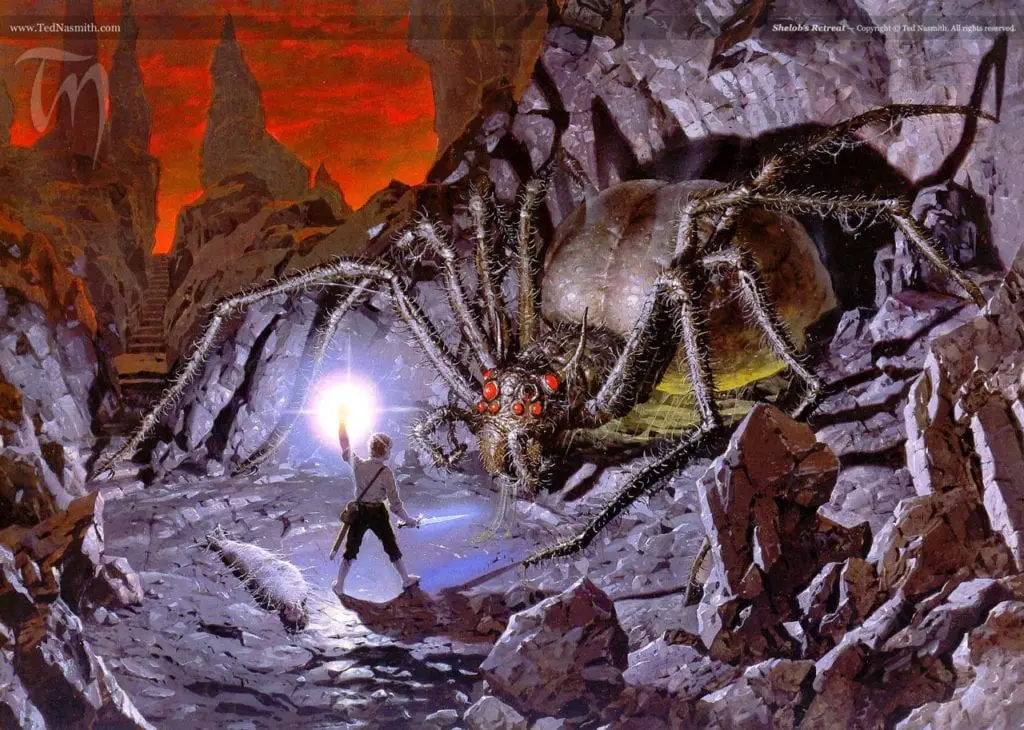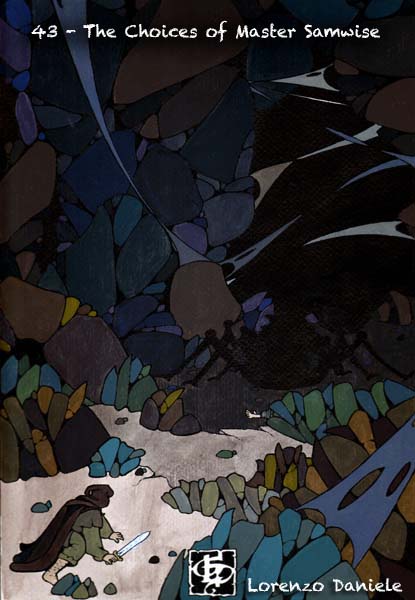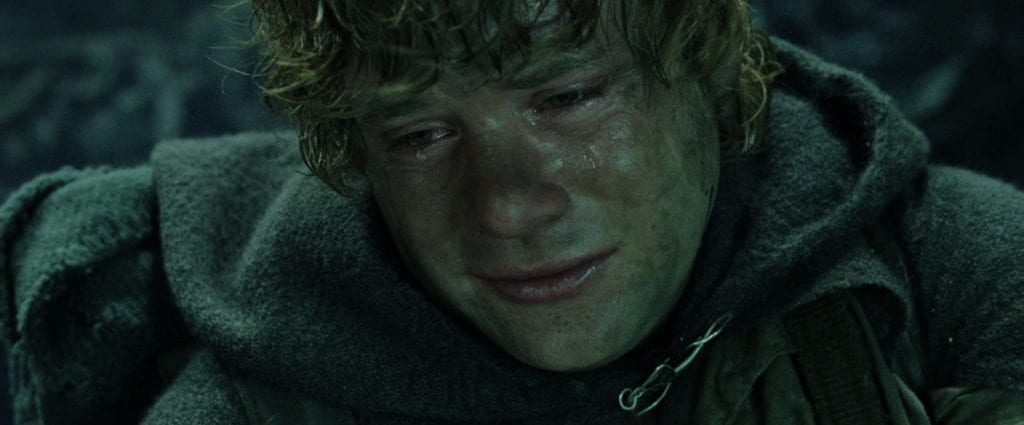It’s a simple statement to make at this point, a cliché or an adage. Tolkien Prose is turgid. His concern for high and lofty things, for Romance-with-a-capital-R, and god, all those trees. It’s too removed, focused less on character than the evocation of mood and time and space. It’s not wrong, entirely. But it’s also not right.
Tolkien’s writing of the Lord of the Rings was a decade-long affair. He began in 1936, he told a would-be publisher in a 10,000-word (!) letter in 1951. And each part, he noted, “has been written many times. Hardly a word in its 600,000 or more has been unconsidered. And the placing, size, style, and contribution to the whole of all the features, incidents, and chapters has been laboriously pondered.” Fair enough. Not necessarily a surprising thing for an author to state. And Tolkien knew this:
“I do not say this in recommendation. It is, I feel, only too likely that I am deluded, lost in a web of vain imaginings of not much value to others… What I intend to say is this: I cannot substantially alter the thing. I have finished it, it is off my mind: the labor has been colossal; and it must stand or fall, practically as it is.”
An author’s claim to have chosen each word with care doesn’t mean they’ve chosen well. But I’ve been surprised throughout this re-read of The Lord of the Rings how often Tolkien can be efficient in his writing, packing layers of meanings into short, resonant scenes. “The Choices of Master Samwise,” as a chapter, is an insistence upon this. It is a culmination of Sam’s role as a hero. And then, in quick, clean succession, it is a deconstruction of what that means.
Impudence of Courage
It’s hard not to enjoy “The Choices of Master Samwise.” It’s a satisfying microcosm of one the story’s more apparent themes, of small people scaling massive barriers powered only by a desperate adherence to themselves. A bright articulation of Sam’s capacity in the face of fear.
The fight with Shelob is short, about two pages in my edition and probably only a few seconds in real time. It’s a good action scene, well-paced and easy to envision. And Tolkien sells its central theme. It’s a fight based on action and radical endurance, as Sam flings himself into an impossible fight and then holds himself there against crushing odds. Tolkien refers at one point to Sam’s “impudence of courage”—an insolent, absurd assault on an ageless monster.
It’s also a nice showcase for Tolkien’s narrative efficiency. The two-page fight scene manages no only to entertain but also to clarify why and how Sam is able to succeed. Sam flings himself into the fight and is immediately faced with impossibility. Shelob’s underside is “knobbed and pitted with corruption… ever thickened from within with layer on layer of evil growth.” No one could pierce it: not Sam, not Beren, not Túrin. But Shelob is stymied by a classical Tolkien trio: the weight of the past, persistence of the individual spirit, and—as with Sauron and Saruman—her own lack of imagination.

It’s key to the fight that Shelob impales herself. Sam would never have been able to, even armed with Sting. But Shelob could not imagine that Sam would stand so long. Why would he? Shelob’s prey for ages has been bitter orcs, or lost lonely creatures who would not last long against stench and darkness and terror. But Sam stands, not bitter or alone, and he pushes further forward:
“Galadriel!” he said faintly, and then he heard voices far off but clear: the crying of the Elves as they walked under the stars in the beloved shadows of the Shire, and the music of the Elves as it came through his sleep in the Hall of Fire in the house of Elrond.
Gilthoniel A Elbereth!
And then his tongue was loosed and his voice cried in a language which he did not know:
A Elbereth Gilthoniel
o menel palan-díriel,
le nallon sí dinguruthos!
A tíro nin, Fanuilos!
And with that he staggered to his feet and was Samwise the hobbit, Hamfast’s son, again.
“Now come, you filth!” he cried. “You’ve hurt my master, you brute, and you’ll pay for it. We’re going on; but we’ll settle with you first. Come on, and taste it again!”
As if his indomitable spirit had set its potency in motion, the glass blazed suddenly like a white torch in his hand. It flamed like a star that leaping from the firmament sears the dark air with intolerable light.
As with Frodo in “Shelob’s Lair,” Sam’s reserve of power and resistance comes from a meshing of past and present. When he touches the Phial of Galadriel Sam is empowered by both his own past and a more distant one. He remembers Elves—for whom he’s always held a special reverence—in the “shadows of the Shire” and in Rivendell. And then he’s pulled even further back, bursting forth with a hymn and language he does not know. But Sam’s victory comes not simply as a channel for something else. The moment that pushes him over the edge is a moment that’s purely his own, as he calls out to Shelob in hurt, vengeance, and determination. The power of the stars linked to a brash, school-yard taunt.
And Shelob runs. It’s a fantastic moment, a bright blast of pure effort as Sam’s love and desperation and hope coalesce into a single clear purpose and power. If you surrender yourself to it while reading, after chapters and chapters of interiority, this burst of purpose is exhilarating. A happy ending is all set up.
And then, of course, Sam shatters.
Sam Gamgee, Hamfast’s Son
In September of 1963, J.R.R. Tolkien wrote a letter to Eileen Elgar, who had asked him to expand on Frodo’s “failure” at the Crack of Doom. Within it, he also discusses Sam.
“Sam is meant to be loveable and laughable… But Sam can be very trying. He is a more representative hobbit than any others that we have to see much of; and he has consequently a stronger ingredient of that quality which even some hobbits found at times hard to bear: a vulgarity—by which I do not mean a mere down-to-earthiness—a mental myopia which is proud of itself, a smugness (in varying degrees) and cocksureness, and a readiness to measure and sum up all things from a limited experience, largely enshrined in sententious traditional “wisdom.” …He did not think of himself as heroic or even brave, or in any way admirable—except in his service and loyalty to his master. That had an ingredient (probably inevitable) of pride and possessiveness: it is difficult to exclude it from the devotion of those who perform such service. In any case, it prevented him from fully understanding the master that he loved.”
It’s a brilliant characterization of Sam, and not a common one. Sam is most often depicted as a simple, earthy hero. And he is! He’s wonderful. But there is a certain willful myopia in Sam’s nature. And it’s both startling and sad to realize how quickly (once Frodo, the bedrock of his worldview, is seemingly taken away) his previous strength and resolve dissipates.

This isn’t a criticism of Sam. I certainly couldn’t have done as well. It’s simply an indication that Tolkien understood his characters very well, and there is a subtle emotional acuity in how he treats them. From an abstract perspective, Sam’s choice at this point is very simple. Of course he should take the Ring and attempt to complete the mission. Frodo, as far as he knows, is beyond any help he can give. If he dallies around, he’s likely to doom all his other friends as well. And Sam knows this. But it’s nearly impossible for him to accept it.
And poor Sam’s mental gymnastics are both painful and immensely relatable; they are a portrait of a person who knows what they have to do but cannot truly accept what it means. The chapter is called “The Choices of Master Samwise” and not “Spider Fight!” for a reason. The emotional cores of the chapter are Sam’s choices and his lack of choices, his fraught emotional response to being abruptly cut off from the beacon of his moral universe despite doing everything right in order to save him.
Sam realizes what he has to do quickly. Despite the “doubt and fear” that shake him, Sam quickly figures out that he needs to take the Ring and go on without his master. But he doesn’t: he sits there, holding Frodo’s hand, “in his heart keeping a debate.”
“Now he tried to find strength to tear himself away and go on a lonely journey – for vengeance. If once he could go, his anger would bear him down all the roads of the world, pursuing until he had him at last: Gollum. Then Gollum would die in a corner. But that was not what he had set out to do. It would not be worthwhile to leave his master for that. It would not bring him back. Nothing would. They had better both be dead together. And that too would be a lonely journey. He looked on the bright point of the sword. He thought of the places behind where there was a black brink and an empty fall into nothingness. There was no escape that way. That was to do nothing, not even to grieve. That was not what he had set out to do. “What am I to do then?” he cried out again, and now he seemed plainly to know the answer: see it through. Another lonely journey, and the worst.”
After a second think-through—this one with detours into revenge fantasies and brief contemplations of suicide—Sam comes to the same conclusion. It is necessary to take the Ring and move along. Even then, though, he tries to weave himself out of it. Even when he does make the decision to take the Ring and walk towards Mordor, he consistently asserts that he has made up his mind. But then just as quickly asserts that he was probably wrong. He weeps, stops, stares backward. And as soon as Frodo arises once again as a focal-point of Sam’s psyche, through the threat of what the Orcs will do to his body, Sam casts all other concerns aside. “It could not be borne,” he thinks to himself. “He sprang up. He flung the Quest and all its decisions away, and fear and doubt with them. He knew now where his place was and had been: at his master’s side.” Sam flirts with reorientation but falls back, his immediate commitments outweighing the distant, abstract ones.

Final Comments
- Though it’s a bit of a tonal shift from the rest of the chapter, I actually got a lot of enjoyment out of the Shagrat / Gorbad conversation at the chapter’s end. It’s a odd glimpse into Mordor middle-management as the two argue over whether Shelob or the Nazgul are a worse neighbor, complain about the unresponsiveness of upper management, and… envision setting up a small business together after the war? “If we get a chance, you and me’ll slip off and set up somewhere on our own with a few trusty lads, no big bosses.” “Ah,” said Shagrat, “like old times.” Okay!
- It’s sorta goofy, but also a kind of neat glimpse into Tolkien’s attitudes towards his Orcs. They’re… not great, but at the same time they’re presented as fighting for Sauron at this point largely because they know that if he loses, the other side will probably kill them. There are also fun little hints at their general worldview, when they mention that leaving a companion behind out of convenience was a “regular elvish trick.” It reminds of the the Mitchell & Webb skit. Are the orcs the baddies?
- Let’s talk about that cliffhanger. Oof. Tolkien intended the whole work to be considered in concert. But still. Sam’s ineffectual charge at the Orcs is such a nice mirror to his effective charge on Shelob earlier in the chapter. And Tolkien pulls out some simple onomatopoeia and clear, snappy sentences to finish off Book IV on a devastating note. “The great doors slammed to. Boom. The bars of iron fell into place inside. Clang. The gate was shut. Sam hurled himself against the bolted brazen plates and fell senseless to the ground. He was out in the darkness. Frodo was alive but taken by the Enemy.” UGH
- C.S. Lewis apparently cried when Tolkien first read this chapter to hmm. Aww. Inklings were a bunch of softies, honestly.
- Letter to Christopher Tolkien in November 1944, on the end of Book IV: “I have got the hero into such a fix that not even an author will be able to extricate him without much labor and difficulty.” Tolkien’s letters are great. They are sweet, nerdy, and full of dire musings about the difficulties of writing.
- Prose Prize: A short one this week. I deeply love the phrase impudence of courage and I’ve been thinking about it all day. It’s what I aspire to now. Impudent courage.
- Contemporary to this chapter: Aragorn captures the Pelagir fleet; Pelannor field is overrun.
- For next time: is there interest in doing a rewatch of PJ’s The Two Towers, as we did with Fellowship? It would be utterly riddled with references to a Tolkien letter I just discovered in which he discusses a 1958 movie pitch. This in non-negotiable. If there’s not interest, though, we can jump right into Return of the King. Tell me in the comments!

